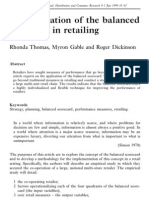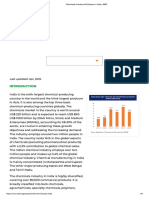SERVICE OPERATIONS
MANAGEMENT ASSIGNMENT
-I
Assess the Role of Services in the Economy with special reference to Service Operations
Submitted To,
Submitted By,
Dr. V V Ravikumar
Name : Shrestha Verma
PRN : 20020141193
Roll No : 43293
1|Page
�Introduction:
The services sector, an industry that produces services rather than physical goods. Economists divided
all economic operations between goods and services into two general divisions. Goods industries are
agriculture, mining, manufacturing, and building; they each produce a tangible form of an object. All
other sectors include insurance, financial finance, wholesale and retail, all technical departments
including engineering, software production, and pharmacy, non-profit industry, all customer care, and
all public service sectors, like the security and administration of justice.
The service industry has expanded steadily over the last century. Around the turn of the 21st century,
the industrial and retail industry was overshadowed as the primary economic sector in most
developing countries. Although the U.S. became the world's dominant economy at the beginning of the
20th century with its large manufacturing sector, its global economic domination by the beginning of
the 21st century had been centered on its massive service industry.
The boom of service has become possible due to the explosion in information, the exponential increase
in connectivity, and fast global contact through Internet links and cellular telephones in the last 50 to
70 years. Another main factor in the shifting of a manufacturing-based economy to a service-based
economy is increasing automation, reducing the number of people needed for production processes.
Overview of Indian Service Sector:
In addition to being the leading industry in India's GDP, the services sectors have drawn
substantial foreign investment, made considerable export contributions, and generated large-
scale jobs. The services sector in India includes a broad spectrum of activities including hotels,
transportation, storage and correspondence, banking, insurance, property, corporate services,
government services, social and personal services, and construction services.
The services business is a significant engine of economic development in India. At current prices
in FY20, services contributed 55.39 percent to Indian Gross Value Added. According to RBI,
service exports in September 2020 amounted to 17.28 billion USD and imports were 10.13
2|Page
� billion USD.
Role of services in Economy:
Economic development in any country depends on the growth and development of the three economic
sectors. In recent years however, in developing countries, the service sector has been growing at a very
faster rate and contributes a great deal to output, revenues and employment. In comparison with
agricultural and industrial sectors, productivity per worker in the service sector is even higher. In the
developed countries, the service sector is already dominant. The service sector therefore plays an
important role in any country's economic development.
Recent service sector developments in India:
The Indian health sector is expected to transfer remote consultations digitally enabled via
telecommunication. In India, the telecom industry is forecast to rise by 31% between 2020 and
2025 in the form of CAGR.
Under the Official Development Assistance for the Health Sector, Japan pledged Rs. 35 billion
(US$ 476,11 million) to tackle the COVID-19 crisis in India and strengthen Indian health systems'
resilience against infectious disorders.
3|Page
� In June 2020, Jio Platforms Ltd. sold 22.38 percent of the equity to 10 international buyers,
covering Facebook, Mubadala (ADI), Silver Lake, General Atlantic, Vista TPG Capital and L.
Catterton, to a total of Rs. 1.04 trillion (USD $ 14.75 billion) within eight weeks in the form of
individual transactions. This is the world's biggest ongoing fundraiser.
In order to promote the high standard of training and technical education, Siemens, BMZ and
MSDE have launched the initiative "IGnITE." IGnITE's mission is to cultivate highly skilled
technicians in order to prepare them for the market and the future.
Government Policies and Initiatives:
Prime Minister Narendra Modi declared on Independence Day 2020 the National Digital
Health Health Mission (NDHM) to provide a unique health identity card for every Indian
Sector population and to revolutionize the medical industry by making it easy for everyone in the
country to access.
Aviation The automatic route allows 100% FDI for air transport services, regional aviation and
Sector domestic passenger services. 100% FDI approval in aviation for international carriers
Banking For more years after 2019-20, the Cabinet Committee on Economic Affairs has authorised
Sector the continuation of the mechanism of recapitalising regional rural banks (RRBs).
Telecom FDI limit has been raised in the telecommunications industry to 100% from 74%. Of 100%,
49% is achieved via the automated route and the remainder is by the approval route of
Sector the Foreign Investment Promotion Board (FIPB).
Intending to transform India into an energetic information society and global knowledge
Educatio powerhouse through holistic, scalable, multidisciplinary school and college training that
n Sector meets the needs of each student in the 21st century, the union cabinet has approved the
national educational policy (NEP) of 2020.
The Ministry of Electronics and Informatics will work over the next five years to maximize
the digital economy's share to 20% of GDP. The Government is developing cloud
IT Sector infrastructure for collaborative networks to be used by AI developers and startups to
create creative solutions.
4|Page
�Road Ahead:
Domestic and global forces control development in the services sector. Between 2015 and
2020, the Indian facility management industry is forecast to rise to 17 percent CAGR and to
conquer a US$19 billion boom in the real estate, retail and lodging industries.
India is the tech export centre. Between 2021 and 2024 the Indian IT outsourcing market is
projected to experience 6-8% development.
It is estimated that the healthcare sector will hit USD 132 billion by 2023. It is projected that
India's digital economy will cross 1 trillion US Dollars by 2025. The IT and business services
market in India is projected to hit 14,3 billion US dollars by the end of 2023, with an expansion
of 8 percent.
Through the introduction of the GST, a single national market was created and the total tax
burden on commodities reduced. Owing to the availability of the GST input credit, cost
reductions are projected to be expected on a long-term basis, with service rates lowered.
5|Page
























































































